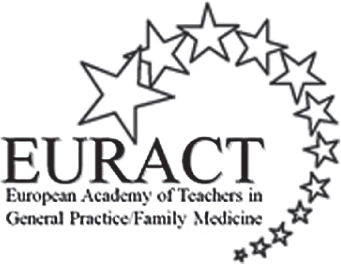
EURACT is the network organization for education of Wonca Europe, the European Society of General Practice/Family Medicine. This statement was drawn up by the Basic Medical Education Committee of EURACT and approved by the EURACT Executive Board according to Council approval. The following members of the Basic Medical Education (BME) Committee were involved in the preparation of the document: Francesco Carelli, Valentina Madjov, Janko Kersnick, Natalia Zarbailov, Givi Javashvili, Mira Kis, and Howard Tandeter, on behalf of the BME Committee.
Taking into account Council Directive 93/16/EEC to facilitate
the free movement of doctors;
the European Credit Transfer System;
UEMO Policy Paper on Specific Training in GP/FM;
Framework for Professional and Administrative Development of GP/FM in Europe, considering the Bologna declaration;
bill of patient rights and other documents on education and training in higher education as WHO–Wonca Framework published in 1998;
and confirmed in series of documents from EU Commissions;
Colleges, Academies, remembering the Alma Ata declaration on the role of primary care;
EU orientation in strengthening primary care;
EURACT states that each University Medical School educating future medical doctors, must offer all students adequate level of knowledge, practice and exposure to family practice care to gain knowledge, skills, attitudes and scope of primary care approach.
To achieve these goals, this statement intends to provide guidance how to tailor existing curricula or how to introduce teaching and training in general practice/family medicine (GP/FM) on all European universities. It is not intended to be a detailed and exhaustive description of the content of teaching curricula as these should be, of necessity, context specific and will depend on the tasks that GP/FM doctors are expected to undertake in different countries. From the Wonca European Definition and the EURACT Educational Agenda, we have retrieved the core European content that is universally applicable.
INTRODUCTION
As indicated in WHO–Wonca Framework published in 1998, and confirmed in a series of documents from EU Commissions, Colleges, Academies (not to say EURACT) every Faculty of Medicine must create a Department of Family Medicine managed by qualified and selected GP/FMs. At the same time, a training period must take place in a GP/FM setting, where students encounter patients.
This teaching and training are recognized as a ‘must’ in all modern societies: medical students cannot become good doctors without knowing family medicine context; family medicine is the keystone for economic welfare, quality and costs. Teachers in GP/FM practice must be qualified GP/FMs, selected according to clear and open criteria as described in the EURACT Statement for Selection of Teachers and Practice in GP/FM.
Medical students also need to acquire specific competencies that are most easily obtained in a general practice setting. These competencies have been clearly outlined by Wonca (World Organization of Family Doctors) in the ‘Checklist for Family Medicine/General Practice Experiences’ and can be grouped in two categories:
management of patients and conditions that are frequently seen in GP/FM, essential for competence with regard to diagnosis, prognosis and appropriate treatment;
development of skills and attitudes specific and necessary as future GP/FM practitioners.
Based on the European society development and for the best of the European population, these teaching and training should be finalized urgently, and with the required quality and relevance.
KEY PRINCIPLES
Considering EURACT Mapping of Undergraduate Teaching of Family Medicine in Europe (showing in detail, which is in delay or worse) and considering EURACT BME Committee’s work and publication on a European Minimal Core Curriculum for teaching Family Medicine. Indicating the line to be followed to get a key homogeneity, to be of help to create and to avoid resistances and possible confusions, these are the key principles.
Each University Medical School should have a fully integrated and operational department of family medicine/general practice, starting with undergraduate training as a part of the process of obtaining a level of clinical competence sufficient for independent practice.
A family medicine/general practice curriculum for undergraduate education should be developed in collaboration with family medicine/general practice departments and medical professional organizations in the country. International collaboration among departments that present a success story in the development of the discipline could be sought.
A family medicine/general practice curriculum should be based on the European Definition of General Practice and the EURACT Educational Agenda. National specifics on organization and delivery of health care on primary care level and collaboration across the interface between primary and secondary care should be appropriately included.
Based on the UEMO policy statement on specific training, a minimum of 50% of training should be in general practice, starting with undergraduate training as a part of the process of obtaining a level of clinical competence sufficient for independent practice.
All students should be able to learn primary care management of patients through a student clerkship in general practice, lasting several weeks during the later years of medical school.
What about this? There should be a minimal core curriculum with a minimum of formative credits. Lectures should be delivered by family physicians/general practitioners and limited to core themes proposed by EURACT and national associations of family physicians/general practitioners. Most of the programme should be in small group work and in one-to-one teaching situations in family physicians’/general practitioners’ practices.
The chairs of the departments must be family doctors with appropriate academic achievements as listed officially from the university as a lack of academic achievements should be overcome by assigning a family physician/general practitioner to co-chair a department for a defined transition period.
CONCLUSION
Family Medicine teaching as well as training are fundamental resources for medicine today and for future generations, as urged by all the international organizations and institutions of medicine.
With this statement, we encourage the management of all medical faculties and departments across Europe to implement teaching and training programmes of family medicine into their curriculum.

